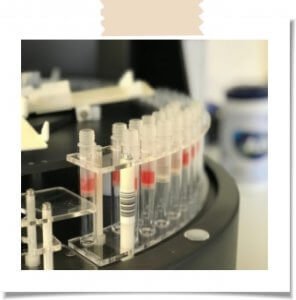What is a food allergy and a food intolerance?
Why do we test for IgG4 and IgE?Testing IgG4 levels and IgE antibodies. What are all the facts?
Why do we test for IgG4 using Blood in our Intolerance Test
IgG1 and IgG4 – What is the process? Testing for IgG4 over IgG1 or total IgG is a massive advantage for Allergy Test. Testing for IgG4 leads to a reduced number of  false-positives, allowing us to deliver much more experienced and targeted results. Out of the four subclasses of IgG, the most commonly tested are IgG1 and IgG4. These are produced in response to food antigens which means we can identify their intolerances a lot easier. As IgG1 antibodies are first responders, we can reach new food antigens by joining the antigens and forming complexes. From there, these complexes are quickly destroyed by immune system cells which are called macrophages. These IgG1 antibodies can then additionally activate further immune reactions, and as such, they complement cascade and inflammation.
false-positives, allowing us to deliver much more experienced and targeted results. Out of the four subclasses of IgG, the most commonly tested are IgG1 and IgG4. These are produced in response to food antigens which means we can identify their intolerances a lot easier. As IgG1 antibodies are first responders, we can reach new food antigens by joining the antigens and forming complexes. From there, these complexes are quickly destroyed by immune system cells which are called macrophages. These IgG1 antibodies can then additionally activate further immune reactions, and as such, they complement cascade and inflammation.
What is an IgG4 Antigen Complex?
Many people are not aware that intolerances can be developed and caused by overindulgence on a certain item. If the body is continuously exposed to a certain item or antigen, then this could lead to a class switch from IgG1 to IgG4 antibody production.
So, what happens?
These IgG4 antigen complexes do not then activate the complement cascade.
Why does this happen?
 Because complexes of IgG4 and food antigens are very stable, and alterations in any sort of structure can lead to new antigen forms. When identifying which items you have an intolerance to, it is important that you understand why your body reacts to the item this way. Measuring your IgG4 levels means you can either rule out or confirm an intolerance as the cause of your symptoms. Order your elite blood test today. Take a look below at how IgG1 can produce an IgG4-antigen-complex, which in turn creates a whole new cycle, going something like this:
Because complexes of IgG4 and food antigens are very stable, and alterations in any sort of structure can lead to new antigen forms. When identifying which items you have an intolerance to, it is important that you understand why your body reacts to the item this way. Measuring your IgG4 levels means you can either rule out or confirm an intolerance as the cause of your symptoms. Order your elite blood test today. Take a look below at how IgG1 can produce an IgG4-antigen-complex, which in turn creates a whole new cycle, going something like this:
IgG1 (class switch) → IgG4 → IgG4-antigen-complex → modification → IgG1 → IgG4
Why is IgG4 the marker of Chronic Food-Immune Reactions?
IgG4 is the marker of Chronic Food-Immune reactions and as a result of this, the complexes will only get larger. From here, these larger complexes are able to activate the complement cascade, and will therefore initiate inflammatory responses within the body. Blood Intolerance testing allows us to detect these complexes. An inflammatory response to a food is the main cause of many symptoms. If you have a food intolerance then this will be the main cause of any symptoms which you may experience. From here, these complexes can also be deposed in tissues or organs, and this leads to plenty of damage, causing the most uncomfortable and nuisance symptoms to an individual. This sequence of events is thought to be the most common way in which individuals develop an adverse reaction to foods, and this is something that they consume on a regular basis. IgG1 antibodies show themselves to be more adhesive and readily bind to any antigens which may come their way. This then raises the prospect of cross-reactivity, meaning there is a number of false-positive results in testing.
Why is testing IgG4 levels an advantage for us?
Testing both IgG1 and IgG4 can sometimes lead to many unnecessary food eliminations. Presenting itself as an antibody, it is a more clinically applicable marker of chronic food-immune reactions. This also includes possible intestinal hyperpermeability. So, compared against each other, between IgG1 and IgG4, IgG4 measurements are less likely to produce false-positives on in-vitro tests. When measuring all ranges of IgG, or total IgG, it is more likely that these antibodies will result in a higher rate of false-positive reactions.
 What is an allergy?
What is an allergy?
An allergy is a type I hypersensitivity. This means that if an individual is exposed to an allergen then it results in the production of immunoglobin E (IgE antibodies), and the release of histamine and symptoms. It is an immediate response known as an IgE-mediated immune response with symptoms occurring almost straight away. That is one of the major differences between an allergy and an intolerance: the time it takes for a reaction and the symptoms to occur. Allergic reactions can occur almost immediately whereas an intolerance reaction can sometimes present itself up to 72 hours later.
How do you spot an allergy?
Allergens themselves are usually quite easy to identify due to the quick nature of which the reaction occurs. A food diary and allergy test can help in this regard. but this does depend on the severity of reaction as well as other factors, including hydration, the time of year and sometimes even the processing of the food, especially with regard to the amount. 
Allergies can be life-threatening
Many people who suffer from an allergy know that an allergic response to a food or a non-food item. This has the potential to be life-threatening in certain individuals. In the case of severe allergies, even the tiniest traces of an allergen can have an effect on the individual. This is particularly important to know in regard to peanuts, as peanuts are used in all sorts of cooking oils and ingredients, and are one of the most common allergies for people to suffer from.
Ingredients, Oils and Different Allergies
Depending on what type of item is ingested, different symptoms will present themselves differently. Symptoms of an allergy can present themselves differently, including skin rashes, hives, vomiting and swelling of the mouth, throat, and tongue. An individual who has multiple allergies may also have different symptoms to different items. Remember, allergies can often be hereditary, and so if someone in your family has an allergy, you should definitely learn whether or not you have an allergy.
What to do if you are experiencing these symptoms?
If you are experiencing any of the listed symptoms of an allergy, then you should immediately order a test and also consult a Doctor. It is incredibly important that you know what to do, as an allergic reaction has the potential to be life-threatening. If diagnosed with a food allergy, you must do your best to consistently avoid these items. In particular, if you have severe allergies or asthma, then education and learning can help you to avoid a life-threatening situation.

Our customer promise. Service to you.
As a global leading health brand, we’re proud to make our transparent Five-Point Promise to each and every customer as well as offering you our No Quibble Guarantee.
Chat live in any language you prefer; 24 hours a day. (Monday – Friday).
Receive accurate results within 10 days of arriving at our testing labs.
Easy to understand, expert advice is available online.
We promise to resolve any complaints fully within just 7 days.
100% Moneyback satisfaction guarantee.
